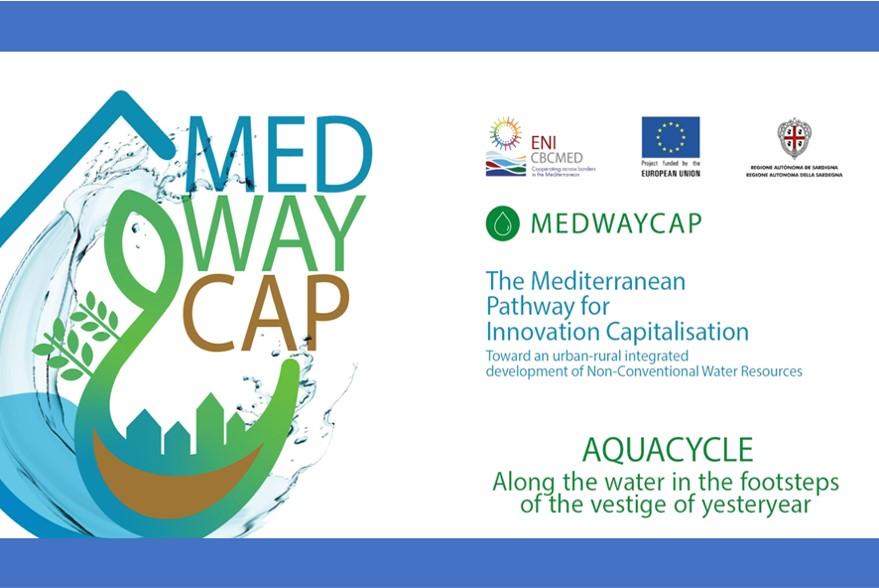AQUACYCLE project storyline narrated in video clip

Watch the AQUACYCLE project storyline narrated through a video clip can be accessed through this link.
The video clip, entitled 'Along the water in the footsteps of the vestige of yesteryear was produced by the Tunisia partner CERTE in the AQUACYCLE partnership within the framework of the ENI CBC Med funded MedWayCap Project.
Transcript of video clip
During a walkabout in the fields of the Bint Saidane region, a locality belonging to the Governorate of Zaghouan, Mr. Mohamed Ahmed, Chief Engineer at the Zaghouan Regional Agricultural Development Commissionership (CRDA-Z) was met by a farmer informing him that: “We haven’t seen rain in 3 years!”. “I have been irrigation using my own means, but now I can’t cope anymore. May God help us!”.
A second farmer, while showing him dry branches from one of his olive trees, exclaimed: “Are these branches capable of producing olives?”. “Look they are infertile!”.
Mr. Mohamed Ahmed listened to the opinion of the first farmer regarding the implementation of a new wastewater treatment plant in the locality to replace the one that stopped functioning. He told him: “the treatment station will solve a huge, huge, huge problem!".
Following on this exposure to the water situation in the Bint Saidane region, we see Dr. Hamadi Kallali, researcher at the Water Research and Technologies Center (CERTE) at the Borj Cedria Technopark entering to the CERTE headquarters and occupy his usual place in his office. He explains: “The AQUACYCLE project started with the idea that we have a problem with rural sanitation first and on the other hand, with the restrictive use of water in plants. The AQUACYCLE project was developed with our Mediterranean partners, and the benefit is mutual.”
He then presents the activities to be carried out: “A pilot was designed to be implemented at the Bent Saidane station in the Zaghouan Governorate. The project chose to use a solution that mimics nature in the treatment of wastewater, especially since we utilize solar energy to disinfect this water.
While scrolling through an animation of the processes used, he continues: “The station is composed of three stages after the collection of wastewater: there is a pretreatment that involves removing all solids, afterwards, there is an anaerobic digestion stage, followed by a treatment stage with macrophytes planted in gravel-filled basins, enabling denitrification. The third stage involves solar disinfection, so as to produce treated, uncontaminated wastewater”.
Returning to the walkabout of Mr. Mohamed Ahmed, the latter initiates a conversation with another farmer. “When you found out that a wastewater treatment station would be installed in the region, to allow you to irrigate your fields, what was your reaction and what was the reaction of farmers in the area?” he asks. The farmer replies “A joy, an alternative leading to happiness”.
While watching the local agricultural manager in active discussion with the farmers of the region, Dr. Hamadi Kallali explains that as part of the project, “a WebGIS has been designed to involve farmers in the project”.
Accompanying the farmers to the region's Agricultural Training Center, Mr. Mohamed Ahmed explains to them with a practical demonstration on a tablet how to use the WebGIS platform, informing them “in this platform where you will position yourself, each one of you will have their username and password to input your personal data”.
Returning to the meeting room at CERTE, we meet up with the staff participating in the project and Dr. Samira Melki explains further about the WebGIS: “it contains the different reference layers such as the vegetation cover, soil depth, salinity levels, and it also contains the accessibility as well as the delimitation, which means the x/y coordinates to know where your parcel of land is located. When we send all this data, the system will combine the different criteria and recognizes the favorable sites for irrigation with wastewater treated with APOC technology”.
Back in the field, Dr. Hamadi Kallali explains that “after the implementation of the entire AQUACYCLE project, the farmer will have more profitable crops”.









